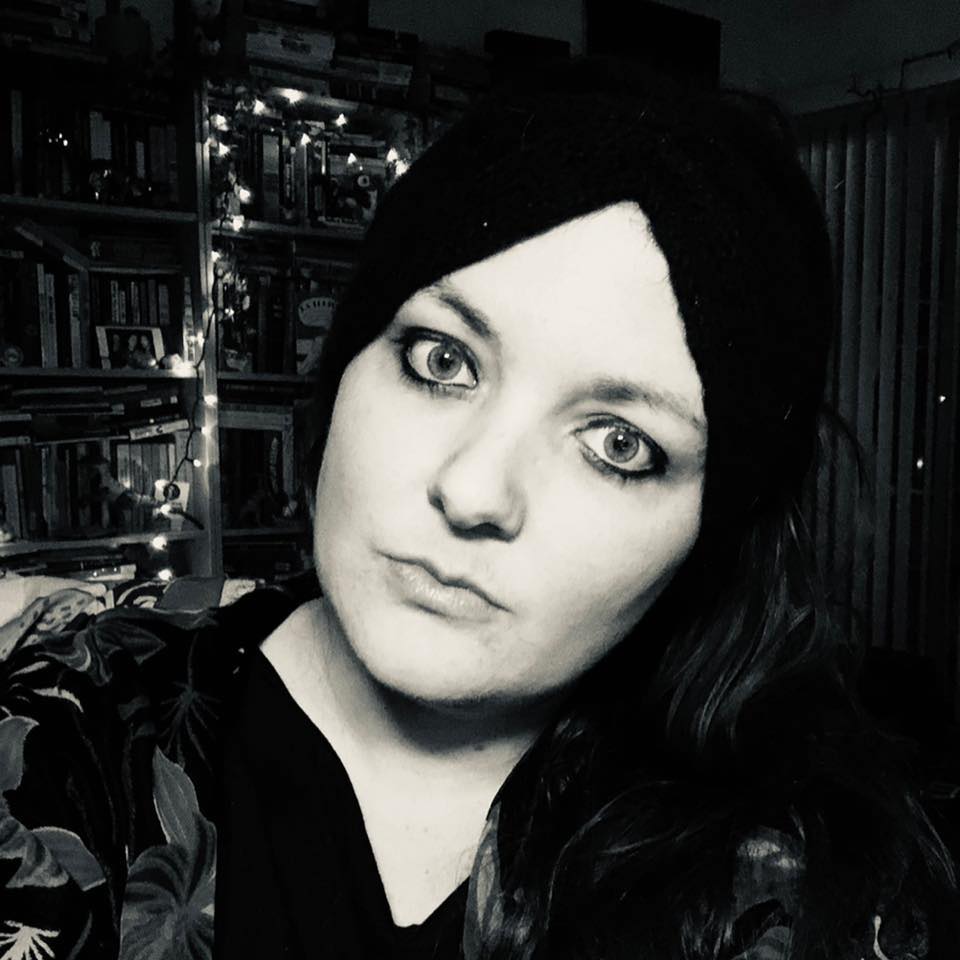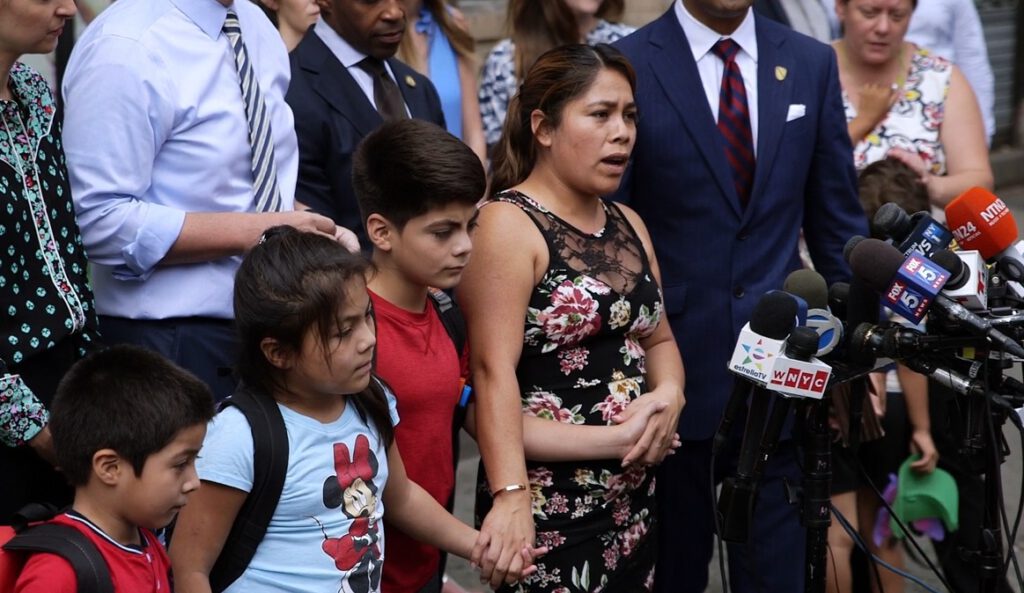The seering political documentary “Split At The Root,” which premiered at SXSW this past weekend, follows the work of ordinary women who band together to support and advocate for asylum-seeking families torn apart in the wake of the Trump administration’s family separation policy known as the zero tolerance policy. Founded in 2018, the non-profit organization has raised over $3 million dollars through mostly small donations to post bond and provide ongoing support for 124 individuals and their families.
Directed by Emmy-winner Linda Goldstein Knowlton, the documentary features footage on the ground following the organization’s early grassroots organizing and caravans that brought women from the Eloy Detention Center in Arizona to New York City to begin fighting for the reunification of their families and continue their asylum process. IFT’s story is also told through interviews with members including co-founder Julie Schwietert Collazo, and asylum seekers Yeni Gonzalez and Rosayra “Rosy” Pablo Cruz.
Filmmaker Linda Goldstein Knowlton spoke with RogerEbert.com before the film’s premiere at this year’s SXSW Film Festival in Austin, Texas.
How did you first learn about the Immigrant Families Together and the work they were doing?
When the zero tolerance policy was enacted in 2018, I, like a lot of people, was just vibrating with rage, and not really quite sure what to do, as opposed to Julie who did. I was just trying to figure out what to do, aside from calling my representatives. I was very lost and very overwhelmed. For all the amazing things about our country, and all the incredibly horrible things that we’ve seen our country do over the last several years, this was just a whole other level that I could not comprehend. So I’m going about my business, trying to make a difference somehow.
Then I saw that there was an organization called Never Again Action who were doing an act of civil disobedience to shut down the GEO Group, which is one of the two for-profit prison companies that they’re used for these family separation detentions. And I was like, I have the privilege to do this. I’m white. I’m middle class. I have the time. I know that there will be an action plan to get us out of jail if we get arrested. So I thought, I have to do this. I have to put my body on the line. I just don’t know what better way of doing this. So I participated in this act of civil disobedience. We did shut down the GEO Group. Did it change the world? No. But it felt like there were a group of people who came together to take a stand, and do what they could and that felt like it was the only way to make change.

When I got out I did what everybody does and posted my arrest photo on Instagram. My friend Marti Noxon who I’ve known for at least 15 years, we worked together on “Code Black” and have been friends and colleagues for a very long time, saw the picture. She said, “When you get out of the slammer give me a call. I think I know your next movie.” Around the time that I was doing this act of civil disobedience, she had met the women of Immigrant Families Together. First through Courtney Sullivan, who was part of the core 15 and a novelist. Then she brought Marti to meet Julie and just kind of made this connection. Marti asked what they needed in addition to money. What support did they need? That led to the idea of telling their story and telling the story of the women who are coming to our country. Why are they coming here? People don’t leave their homelands and their countries and their families just on a whim. So it’s really looking at what was this crisis? Not just the crisis that was being made by Trump, but also by years and years of policy.
We knew that we wanted to tell a story that was really intimate, that really could give people the opportunity to meet these incredible, powerful, badass brave women who are making this change. They’re making a change that they don’t even know what all the effects are going to be. But they need to do something to save their families. I think what can happen with these kinds of immigration stories in particular, is it helps bring focus. When it is just enormous numbers it’s really easy to tune out. But when it’s this woman named Rosy or this woman named Yeni, and you get to understand them personally, that hopefully can bring people a better understanding. It shows we need to take better care of people. We need to be better neighbors. We need to just act as better humans.
How did you decide on telling Yeni and Rosy’s stories in particular?
Yeni is the catalyst. Yeni was the whole reason that IFT exists. So we had to start with the catalyst. We asked Yeni if she wanted to participate in this. Then we found Rosy by asking the core IFT women to recommend women who would be comfortable being on camera and would be comfortable sharing their experience. Someone who is in a place psychologically and emotionally capable of sharing their story. They all recommended Rosy. That is how Yeni and Rosy became our main collaborators.
Working with my longtime cinematographer Nelson Hume, who introduced me to the woman who became the co-cinematographer Nancy Serna-Guerrero. Nancy was a very integral part of the filmmaking process. She is from Mexico. She’s bilingual. She’s queer. She’s an immigrant. She just got her green card. We were talking about how we wanted to tell the story and how to differentiate between our asylum seeking families, and then the American women of IFT. We talked about using a lens mechanism called EyeDirect. So they are looking right at me, not into the lens, so they are having a very direct personal conversation, but it feels like she is having a direct conversation with the audience. It was really purposeful to have only used that technique with Yeni and Rosy.
How did you get the footage of the first caravan with Yeni?
That was all shot before I started. And I have the great good fortune of working with several you know outlets and camera people who had shot this footage. The story was so important to them that I was able to license their footage. Some of that footage is from a really great piece Emily Kinskey put together for Time. We were able to use a lot of footage that she wasn’t able to use in her piece. Then we have some footage from Sandi Bachom, who’s a badass photojournalist. She’s like 70-something and she’s everywhere. If I could have, I would have been in those cars on the caravans. But I found out about the whole story after that had already happened.
How long do you foresee the repercussions of what happened during the zero tolerance policy to last?
It’s lifelong. That’s why when we started telling the story, of course none of us knew about the pandemic, so the making of the film went longer than any of us had anticipated. But it gave us this gift of being able to continue to follow the experiences of these families. The zero tolerance policy has long gone from the news cycle. So that’s key. It’s crucially important for me that we look at these stories and remember there are people’s lives, actual human lives, that are being affected and will have lifelong repercussions based on some political … I’m looking for a word besides bullshit.
Sometimes that’s the right word.
There are these horrible things in the news cycle all the time, and then they leave the news cycle, but those people are still living their lives. We owe them something.
I love early in the film when Rosy says she was touched by the fact that some people still have kind hearts. How did you infuse this radical kindness into the story you told in this documentary?
Using their example to lead, and the examples of the women of IFT. People are angry, of course. People are in pain, of course. People are hurt. It’s not to dismiss these very real experiences. However, for us to truly make change and meet people where they are, we have to have radical kindness. We can’t feel like shutting down. We have to reach people where they are and with the kindness that everyone needs and deserves. It can be on all these different levels. It’s a little kindness. It’s a big kindness. It’s that one piece of effort that you make, or Julie makes, or Francisco makes or Rosy makes, right? It can be life-changing when all of those pieces build up. I feel like to truly make change, it won’t come from a hardened heart. Right? There can be reactionary efforts, but I don’t think that that actually makes real change. I think it’s just a big reaction. And that doesn’t necessarily help people heal and move on and grow.
The film is full of a lot of facts and a lot of emotions swirling. How do you hope people feel when the film is over?
I hope that combination of those feelings and facts will show people that they don’t need to shut down and instead of being like, wow, this is overwhelming I can’t do anything, they are inspired. This whole movie is about women who have said, “No, we’re not doing things like that, we are going to make a difference for people.” Whether it’s Yeni coming out with that list of names and helping 10 women and their families. Or Rosy and Jordy meeting with other kids and other families who have been making this transition to living in New York. Or whether it’s the IFT, the core people or the volunteers that, you know, sign up to to help a family figure out how to get into school. Just figure out simple things like what’s their school district? How do they get into school? These basic things that we might take for granted, but for people who have just come here, and especially after being traumatized, it must feel like being dropped on Mars. How do you figure out how to navigate all these things?
I hope people come away knowing that there are any number of small pieces of action, that they can take small steps, big steps, everything depending on what you can do that week, depending on what you can do that day. It’s all important and in the end to not back away from doing anything just because it’s so overwhelming. Everybody can do one thing. That’s what I hope audiences come away with from this film. Let’s just focus on that part. We’re never going to change our immigration policy If we don’t get really, really, really damn loud. We can help individual people and we can get loud with our representatives and demand change.












